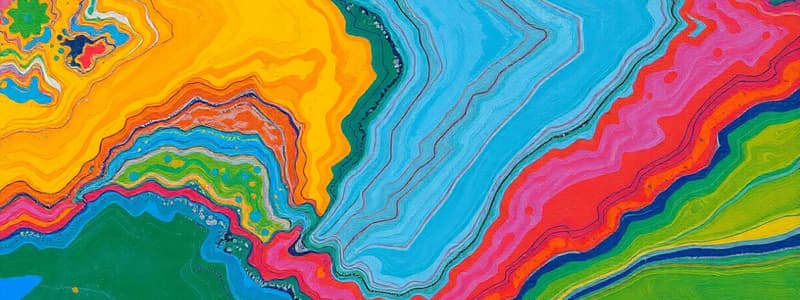Podcast
Questions and Answers
What is weathering?
What is weathering?
Weathering is the breakdown of rocks into smaller pieces, worn away, or dissolved.
What are the two main types of weathering?
What are the two main types of weathering?
- Mechanical and Physical (correct)
- Mechanical and Chemical
- Chemical and Biological
- Physical and Biological
What factors influence the rate of weathering?
What factors influence the rate of weathering?
- Amount of exposed surface area
- Mineral composition of the rock
- Prevailing climate
- All of the above (correct)
Which of the following is NOT a major process of chemical weathering?
Which of the following is NOT a major process of chemical weathering?
Which of the following is a common product of chemical weathering?
Which of the following is a common product of chemical weathering?
Biological weathering is only caused by plants.
Biological weathering is only caused by plants.
Weathering involves transportation of materials.
Weathering involves transportation of materials.
What is the role of water in frost wedging?
What is the role of water in frost wedging?
What is exfoliation?
What is exfoliation?
How does thermal expansion and contraction affect rocks?
How does thermal expansion and contraction affect rocks?
Explain how lichens contribute to biological weathering.
Explain how lichens contribute to biological weathering.
Flashcards
Weathering
Weathering
The process of breaking down rocks into smaller pieces, wearing them away, or dissolving them.
Agents of Weathering
Agents of Weathering
Factors that cause weathering, including water, temperature variations, atmospheric gases, and biological activity.
Chemical Weathering
Chemical Weathering
Weathering that changes the chemical composition of rocks.
Mechanical Weathering
Mechanical Weathering
Signup and view all the flashcards
Organic Weathering
Organic Weathering
Signup and view all the flashcards
Dissolution
Dissolution
Signup and view all the flashcards
Hydrolysis
Hydrolysis
Signup and view all the flashcards
Oxidation
Oxidation
Signup and view all the flashcards
Frost Wedging
Frost Wedging
Signup and view all the flashcards
Exfoliation
Exfoliation
Signup and view all the flashcards
Thermal Expansion and Contraction
Thermal Expansion and Contraction
Signup and view all the flashcards
Products of Chemical Weathering
Products of Chemical Weathering
Signup and view all the flashcards
Rate of Weathering
Rate of Weathering
Signup and view all the flashcards
Water (Weathering Agent)
Water (Weathering Agent)
Signup and view all the flashcards
Temperature (Weathering Agent)
Temperature (Weathering Agent)
Signup and view all the flashcards
Atmospheric Agents (Weathering)
Atmospheric Agents (Weathering)
Signup and view all the flashcards
Biotic Agents (Weathering)
Biotic Agents (Weathering)
Signup and view all the flashcards
Exposed Surface Area
Exposed Surface Area
Signup and view all the flashcards
Mineral Composition of Rock
Mineral Composition of Rock
Signup and view all the flashcards
Prevailing Climate
Prevailing Climate
Signup and view all the flashcards
Study Notes
Weathering
- Weathering is the process where rocks break down into smaller pieces, are worn away, or are dissolved.
- It's caused by both abiotic (non-living) and biotic (living) factors.
- Biotic factors are caused by living things like animals and humans.
- Abiotic factors are non-living, physical, and chemical components of the environment.
- Weathering does not involve the movement of materials during decomposition.
Learning Objectives
- Define and explain weathering.
- List down the different agents of weathering.
- Enumerate and describe the types of weathering.
- Describe the components of each type of weathering.
Weathering Agents
- Water
- Temperature
- Atmospheric
- Biotic
Rate of Weathering
- Amount of exposed surface area
- Mineral composition of rock
- Prevailing climate
Types of Weathering
- Chemical Weathering:
- Changes due to chemical activity.
- Modifies rock composition.
- Agents of chemical weathering: oxygen, rainwater, carbon dioxide, and acids.
- Products of chemical weathering include clay minerals, metal ores, oxide minerals, and rounding boulders.
- Mechanical or Physical Weathering:
- Due to physical stresses.
- Changes physical attributes, but composition stays the same.
- Occurs due to changes in temperature and pressure.
- Major processes: frost wedging, exfoliation, and thermal expansion and contraction.
- Organic or Biological Weathering:
- Plants, animals, and microorganisms are agents of rock disintegration.
- Integration of mechanical and chemical weathering.
- Plants growing on rocks.
- Lichen and algae inhabiting rock surfaces, releasing organic acids that consume minerals, increasing susceptibility to mechanical/chemical weathering.
Chemical Weathering: Major Processes
- Dissolution: Elements dissolve in water.
- Hydrolysis: Positive ions are replaced by active hydrogen ions that come with water.
- Oxidation: Oxygen interacts with minerals.
Mechanical or Physical Weathering: Major Processes
- Frost wedging: Water expands when it freezes, putting pressure on rocks, causing them to crack. Water is the key agent, affected by temperature changes.
- Exfoliation: Detachment of sheets of rocks due to instability in pressure. Pressure inside the rock is greater than the pressure on the surface of the rock permitting expansion.
- Thermal expansion and contraction: Alternating expanding and contracting of crystals due to heating and cooling. Extreme and sudden changes in temperature (like campfires) can trigger this.
Studying That Suits You
Use AI to generate personalized quizzes and flashcards to suit your learning preferences.
Related Documents
Description
Test your knowledge on weathering, the natural process that breaks down rocks through various agents. This quiz covers the definitions, types, and factors affecting weathering, including both abiotic and biotic influences. Challenge yourself to enumerate the different agents and understand their roles in the weathering process.




